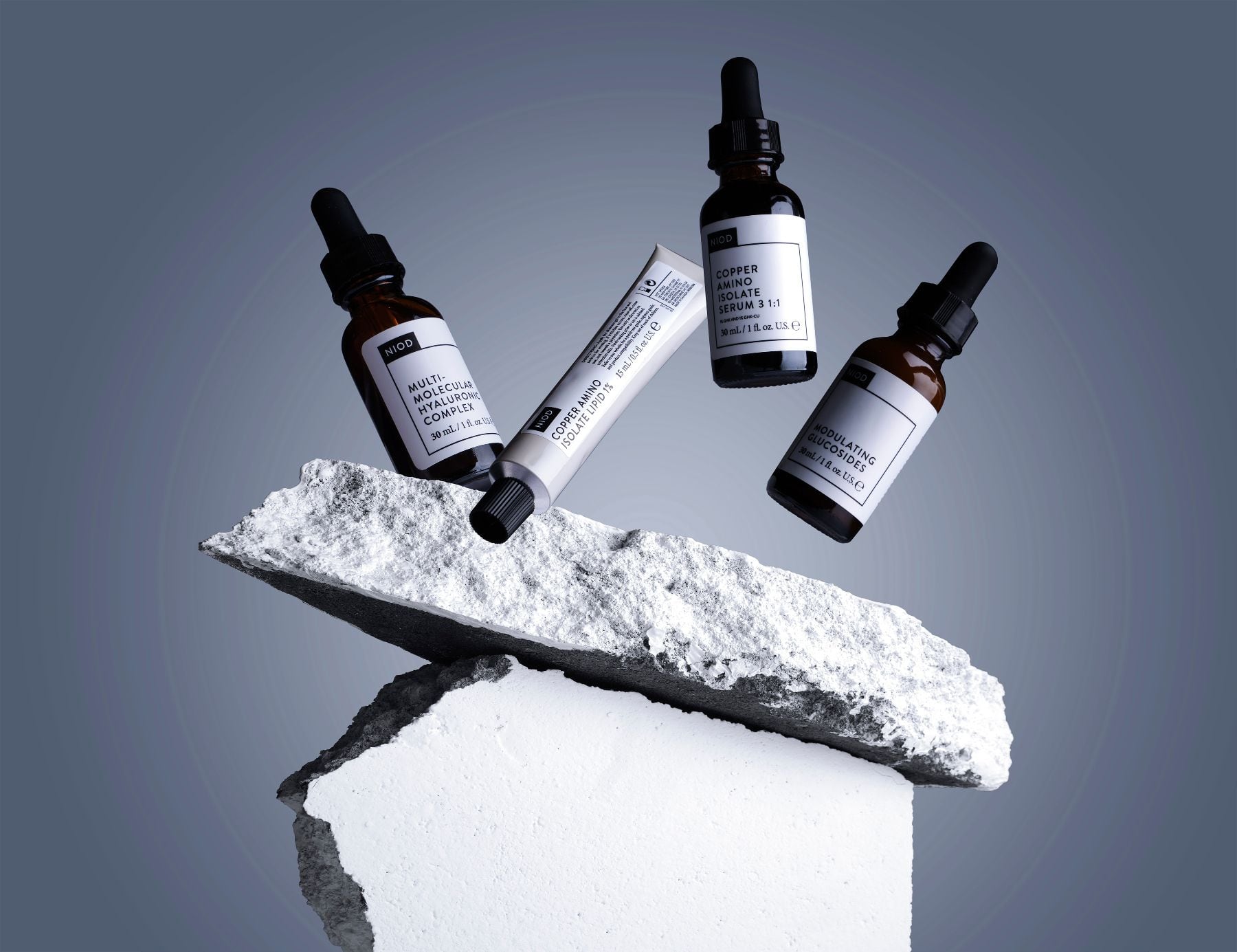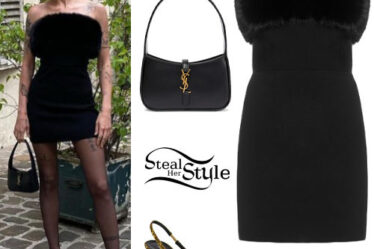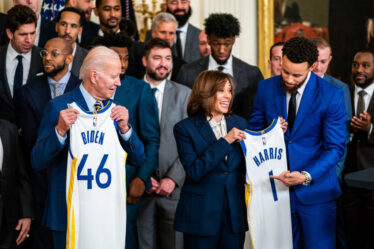
If you’ve heard of Deciem at all, it’s almost certainly for its low-price skincare brand The Ordinary. Only true beauty fanatics would be able to name even a few of the more than 10 other brands the company has released since its 2013 launch. That was by design. Deciem went all-in on The Ordinary after it took off in 2017, eventually shutting down all but two other lines.
Now, Deciem, which was acquired by The Estée Lauder Companies in 2021, is dusting off one of those less-talked-about brands.
Originally launched in 2015, NIOD (an acronym for Non-Invasive Options in Dermal Science) is the chalk to The Ordinary’s cheese. The Ordinary’s branding is all about simplicity, with products often named after a single active ingredient, packaged in sterile and lightweight materials, and sold for prices as low as $4.70.
NIOD marketing and brand messages verge into Kafkaesque territory. Some products are named for multiple raw ingredients, such as copper amino isolate serum 3 1:1 (the brand provides the helpful acronym “CAIS3″). Others are more cryptic: an antioxidant serum is called Survival 0; Sanskrit Saponins is a cleanser. The longer names come with prices to match, with a tiny bottle of eye serum costing $70.
NIOD’s technical product names and tagline “Your skin is intelligent. Optimise accordingly” fit neatly into the ever-growing crop of “science-backed skincare” brands elbowing for room on Sephora’s shelves. They’re also straight out of The Ordinary’s playbook (or perhaps the other way around, as NIOD launched a full year before its lower-priced sister brand).
But Estée Lauder could use a hit. The Ordinary is successful enough to have its own dedicated Reddit and Facebook fan forums, and is a persistent bright spot in its parent company’s otherwise dreary earnings – chief executive Fabrizio Freda name-checked the brand multiple times in its second quarter 2024 results, saying it had “extraordinary success,” with net sales growth in every region.
With NIOD, new products, new distribution lines and a marketing push will soon roll out, and an external PR agency has been hired for the brand.
It’s rare for lightning to strike twice in the skincare industry. But NIOD has a shot, said Dr. Julian Sass, a cosmetic developer and content creator. He described the brand as embodying many of the traits consumers love about The Ordinary, but with a promise of better results.
“So many of [NIOD’s] products are so much better than The Ordinary, both in terms of the quality of the formulas and the raw material,” he said.
A Return to Roots
NIOD was Deciem’s first skincare brand, but as orders for The Ordinary’s affordable products began to fly in, production of NIOD’s more-complex products had to slow down (even its packaging is manually assembled).
“In any business, you have to make difficult decisions,” said Nicola Kilner, Deciem’s co-founder and chief executive. “If we needed 1,000 [of NIOD’s hyaluronic acid serum], but we also needed 100,000 of The Ordinary’s version, that always got priority on the production line.”
While the brand was never officially put on pause, no new NIOD products have been released since 2020. Now, the company is in a better position to satisfy increased demand, having invested in more machinery, and improved its supply chain. Its fill rate – the percentage of orders that can be fulfilled based on existing inventory – is 96 percent, whereas a few years ago, it was 50 percent at best.
Kilner said the last half decade hasn’t been wasted, describing NIOD’s customer base as “very engaged.” It’s much smaller, however: NIOD has 18,000 Instagram followers, to The Ordinary’s 2.4 million.
Complex on Purpose
It’s possible that NIOD was simply ahead of its time.
The Ordinary led with hero ingredients like hyaluronic acid and niacinamide that, while sometimes a mouthful, could be quickly explained by a Google search. NIOD’s acronyms and lengthy product names required an extra level of skincare literacy.
Nearly a decade later, you’re as likely to see The Ordinary’s products in a beauty editor’s bathroom cabinet as you are in that of a twenty-something bachelor who doesn’t own a bed frame.
The in-the-know skincare aficionados have levelled up, and NIOD is targeted at those early adopters. Kilner described NIOD’s range having a focus on pre-cursors, ingredients that can spur the skin’s own regenerative processes.
Deciem is hoping that the burgeoning longevity movement will provide a fresh customer base. A subsect of wealthy consumers have become more interested in wellness services and products designed to enhance lifespan.
For a consumer well-versed (or at least, willing to learn) about biomimicry and other health hacks, NIOD offers an appealing proposition. But a casual shopper may not know what to make of Survival 0, an antioxidant serum described as part of a “range of four networked protection systems,” offering protection against “the superoxide radical, nitrogen radicals and carbonyl radicals.”
“I only know a lot of what these products do because, firstly, I make products and also I know people who could help me interpret it,” Dr. Sass said.
Dr. Sass added that when he’s made content about NIOD products, he has to break things down in order for his audience to follow along.
“When it’s too high level, then you lose people,” he said. (Dr. Sass said he has not been paid for his NIOD content and has no other financial relationship with the brand.)
Kilner said NIOD’s complexity is part of its appeal.
“We don’t need to please everyone … we’ll never dumb down our science to please a consumer,” she said.
The complex messaging is one reason Kilner said she expects NIOD sales to primarily come, at least in the beginning, through its own channels. Its top-performing bricks-and-mortar store is in Seoul, though products are for sale at Selfridges and a few other retailers. Facials will also soon be available in Harrods, the upmarket London department store.
In-House Competition
NIOD’s team will also have to convince consumers the higher price point is worth it. For instance, both NIOD and The Ordinary sell hydrating hyaluronic acid serums, but NIOD’s costs six times more. The pricier brand says it uses a different formula that is 8.25 times more expensive, containing 15 forms of hyaluronic acid compounds including precursors and mimetics, while the cheaper one contains just five.
“NIOD uses technologies so new, sometimes so new there’s only one manufacturer,” said Kilner.
NIOD is identifying new raw materials and investing in the clinical legwork to support bigger claims about efficacy. In 2023, it secured its first patent for a copper peptide blend that it says improves skin radiance and texture. The first NIOD product to use it retails at $93, but the technology has also been shared with The Ordinary, which launched a less-concentrated version for $32, its most expensive product yet.
Ultimately, Kilner says the brand will be led by what the labs provide. If they discovered important enough technologies to warrant it, NIOD “would charge $300 for a product,” said Kilner.
“We are not afraid of the price point,” she said.
The clinical claims section of the beauty market is led by ultra-premium brands like Révive, Dr Barbara Sturm and Augustinus Bader, all of which offer serums with triple digit price tags and all the grandeur to match, from tasteful packaging, evocative names and light textures.
Deciem is betting that NIOD’s customer is a little different: someone who wants the most cutting edge option at every turn, even when a cheaper alternative is available – or maybe even a more expensive one with a more luxurious feel.



